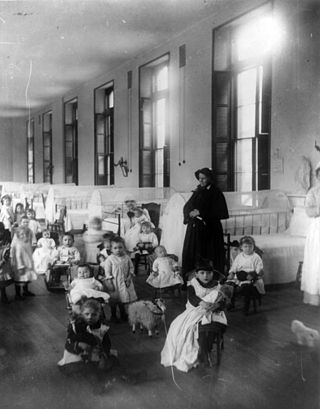
Adoption is a process whereby a person assumes the parenting of another, usually a child, from that person's biological or legal parent or parents. Legal adoptions permanently transfer all rights and responsibilities, along with filiation, from the biological parents to the adoptive parents.

A time-out is a form of behavioral modification that involves temporarily separating a person from an environment where an unacceptable behavior has occurred. The goal is to remove that person from an enriched, enjoyable environment, and therefore lead to extinction of the offending behavior. It is an educational and parenting technique recommended by most pediatricians and developmental psychologists as an effective form of discipline. Often a corner or a similar space where the person is to stand or sit during time-outs is designated. This form of discipline is especially popular in Western cultures.

Foster care is a system in which a minor has been placed into a ward, group home, or private home of a state-certified caregiver, referred to as a "foster parent" or with a family member approved by the state. The placement of the child is normally arranged through the government or a social service agency. The institution, group home, or foster parent is compensated for expenses unless with a family member. In some states, relative or "Kinship" caregivers of children who are wards of the state are provided with a financial stipend.
School violence includes violence between school students as well as attacks by students on school staff. It encompasses physical violence, including student-on-student fighting, corporal punishment; psychological violence such as verbal abuse, and sexual violence, including rape and sexual harassment. It includes many forms of bullying and carrying weapons in school. It is widely believed by society to have become a serious problem in recent decades in many countries, especially where weapons such as guns or knives are involved.
Attachment therapy is a pseudoscientific child mental health intervention intended to treat attachment disorders. It is found primarily in the United States, and much of it is centered in about a dozen clinics in Evergreen, Colorado, where Foster Cline, one of the founders, established his clinic in the 1970s.
Parent management training (PMT), also known as behavioral parent training (BPT) or simply parent training, is a family of treatment programs that aims to change parenting behaviors, teaching parents positive reinforcement methods for improving pre-school and school-age children's behavior problems.
The behavioral analysis of child development originates from John B. Watson's behaviorism.
Attachment-based therapy applies to interventions or approaches based on attachment theory, originated by John Bowlby. These range from individual therapeutic approaches to public health programs to interventions specifically designed for foster carers. Although attachment theory has become a major scientific theory of socioemotional development with one of the broadest, deepest research lines in modern psychology, attachment theory has, until recently, been less clinically applied than theories with far less empirical support. This may be partly due to lack of attention paid to clinical application by Bowlby himself and partly due to broader meanings of the word 'attachment' used amongst practitioners. It may also be partly due to the mistaken association of attachment theory with the pseudo-scientific interventions misleadingly known as attachment therapy. The approaches set out below are examples of recent clinical applications of attachment theory by mainstream attachment theorists and clinicians and are aimed at infants or children who have developed or are at risk of developing less desirable, insecure attachment styles or an attachment disorder.
Social competence consists of social, emotional, cognitive, and behavioral skills needed for successful social adaptation. Social competence also reflects having an ability to take another's perspective concerning a situation, learn from past experiences, and apply that learning to the changes in social interactions.
Callous-unemotional traits (CU) are distinguished by a persistent pattern of behavior that reflects a disregard for others, and also a lack of empathy and generally deficient affect. The interplay between genetic and environmental risk factors may play a role in the expression of these traits as a conduct disorder (CD). While originally conceived as a means of measuring the affective features of psychopathy in children, measures of CU have been validated in university samples and adults.

Kenneth Dodge is the William McDougall Distinguished Professor of Public Policy and Professor of Psychology and Neuroscience at Duke University. He is also the founding and past director of the Duke University Center for Child and Family Policy and founder of Family Connects International.
School-based prevention programs are initiatives implemented into school settings that aim to increase children's academic success and reduce high-risk problem behaviors.
Adverse childhood experiences (ACEs) encompass various forms of physical and emotional abuse, neglect, and household dysfunction experienced in childhood. The harms of ACEs can be long-lasting, affecting people even in their adulthood. ACEs have been linked to premature death as well as to various health conditions, including those of mental disorders. Toxic stress linked to child abuse is related to a number of neurological changes in the structure of the brain and its function.
Jenae M. Neiderhiser is an American behavior geneticist who is a Distinguished Professor of Psychology and Human Development and Family Studies at Pennsylvania State University, where she is also co-director of the Gene Environment Research Initiative.
Judy Garber is a clinical psychologist known for her research on emotional dysregulation and mood disorders, with a focus on cognitive-behavioral interventions for adolescents who have depression. Garber is Cornelius Vanderbilt Professor of Psychology and Human Development at Vanderbilt University.
Deborah M. Capaldi is a developmental psychologist known for her research on at-risk male youth and the intergenerational transmission of substance use, antisocial behavior, intimate partner violence, and child abuse. She is a senior scientist at the Oregon Social Learning Center. Her current projects focus on child exposure to family violence and parenting practices of at-risk parents.
Daphne Blunt Bugental was a psychologist known for her research on parent-child relationships, infant and child maltreatment, and family violence. At the time of her death, she was Professor Emerita of Psychology at the University of California, Santa Barbara.
Leann L. Birch was an American developmental psychologist, best known for her research on children's eating behaviors.

Debra A. Murphy is a Professor Emerita at the University of California, Los Angeles in the Department of Psychiatry.

Jessica Schleider is an American psychologist, author, and an assistant professor of clinical psychology at Stony Brook University. She is a faculty affiliate at the Alan Alda Center for Communicating Science and the lab director of the Lab for Scalable Mental Health.






